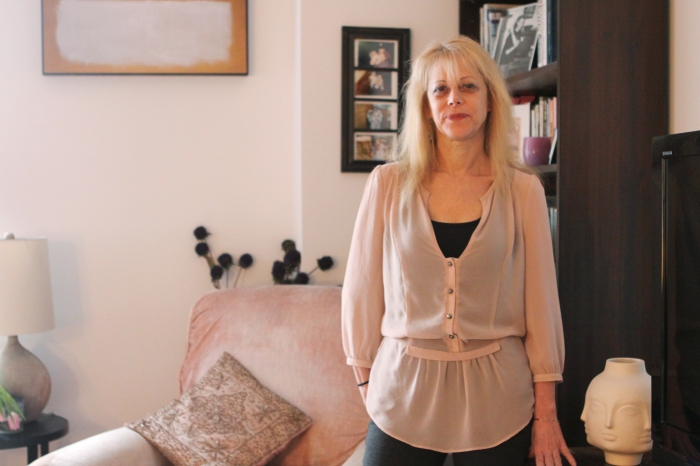By DEVON SHERIDAN
CULTURE EDITOR

Elizabeth Zanghi/The Ram Karen Greenberg, an expert in America’s torture history, finds fault in Zero Dark Thirty.
Nearly four weeks ago, Zero Dark Thirty opened nationwide in theaters to a unique deluge of laudation and criticism. With a subsequent Best Picture nomination, the movie remains a topic of discussion as entertainment pundits continue annual Oscar debates while everyone looks forward to the Academy Awards ceremony on Feb. 24. Yet, before its widespread release (the movie screened for a short time in select theaters on Dec. 19), Zero Dark Thirty and its director Kathryn Bigelow (The Hurt Locker) were drawing a firestorm of criticism that had very little to do with actors or terms like “cinematography” and “adapted screenplay.”
Over the past month and a half, a large contingent of critics of Zero Dark Thirty has taken offense to the movie’s portrayal of torture. One of these critics is Professor Karen Greenberg, Director of the Center on National Security at Fordham Law. Greenberg, a leading expert on the Bush administration’s anti-terrorism policies, is also the author of the book “The Least Worst Place,” which provides a narrative account of the first 100 days of operations at the Guantanamo Bay facilities following the Sept. 11 attack. In an interview with The Fordham Ram, Greenberg mapped out her qualms with Zero Dark Thirty, its director and the subject of America and torture.
Her main issue with the movie is the “lack of a dissenting voice” from any character within the movie on the subject of torture. Greenberg also questions the historical accuracy of the movie’s portrayal of the types of torture used and the frequency with which torture was carried out by the United States government in its hunt for Osama bin Laden.
“[The movie is] insufficiently respectful of the documented history of America’s use of torture, especially following the Sept. 11 attacks and the hunt for bin Laden,” she said.
This is the very issue that landed Bigelow and Zero Dark Thirty screenwriter Mark Boal in hot water following limited screenings of the movie back in late December. On the opening date of the advanced screenings, a concurrent letter citing affiliation with the Senate Committee on Intelligence was sent to Sony Entertainment asking the movie to change the impression that torture was an effective tool in the manhunt for bin Laden in 2011. Currently, the committee is threatening the filmmakers with an investigation and has asked for documents provided by the CIA for use in writing the Zero Dark Thirty storyline.
In an interview with ABC’s “This Week,” Boal responded to the politically fueled accusations:
“I think the controversy in a lot of ways predates the film. And I believe that we capture the essence of what happened and so do many other people who have lived through it,” Boal said. “I approached the research the way I would’ve approached the research of any article or if I was writing a book. But then there’s a second stage, which is you take that research and you compile it and transform it into a screenplay. It’s dramatized.”
Indeed, the story is a dramatization of the real life hunt for bin Laden, but this is not news to Greenberg and those like her who have found fault with the movie. Nor, Greenberg believes, is it an excuse to twist the facts. Maybe her biggest issue with the movie, the “lack of dissenting voice” to torture is, she asserts, most prevalent in the movie’s portrayal of the authoritative institutions who headed the hunt for bin Laden.
“The lack of any voice questioning the use of torture, whether it be a person in the CIA or FBI, is highly inappropriate,” Greenberg said. She also takes offense to the movie’s “portrayal of the CIA as bumbling, except for a lone, determined operative, and lost in terms of the next step.”
In this way, she asserts, the movie emphasizes the use of torture by the American government as the only productive means of catching the bad guys and, in effect, the movie leads the American people to believe that torture is a strong and viable option for American safety.
“This is a movie that attempts to tell us about what keeps us safe and what will continue to keep us safe,” she said.
Politicians, pundits and other members of the media particularly disturbed by the movie’s message have gone so far as to label the movie as propaganda. When asked if she considered Zero Dark Thirty propagandist in nature Greenberg responded:
No, but I think the American public has been woefully misled to believe that the content of [the movie] represents the moral fabric of this country.”
Categories: Arts & Entertainment
 TOP’s “Henry IV” Brings Shakespearean History to Life
TOP’s “Henry IV” Brings Shakespearean History to Life  La La Lush Brings New Tunes to Bowery
La La Lush Brings New Tunes to Bowery  WHO’S THAT KID? It’s Patrick Donovan Hood, FCRH ’17
WHO’S THAT KID? It’s Patrick Donovan Hood, FCRH ’17  Assessing the Cost to See Priceless Art
Assessing the Cost to See Priceless Art  Editor’s Pick: Trivia, AD at McGee’s
Editor’s Pick: Trivia, AD at McGee’s
Reply to The Fordham Ram